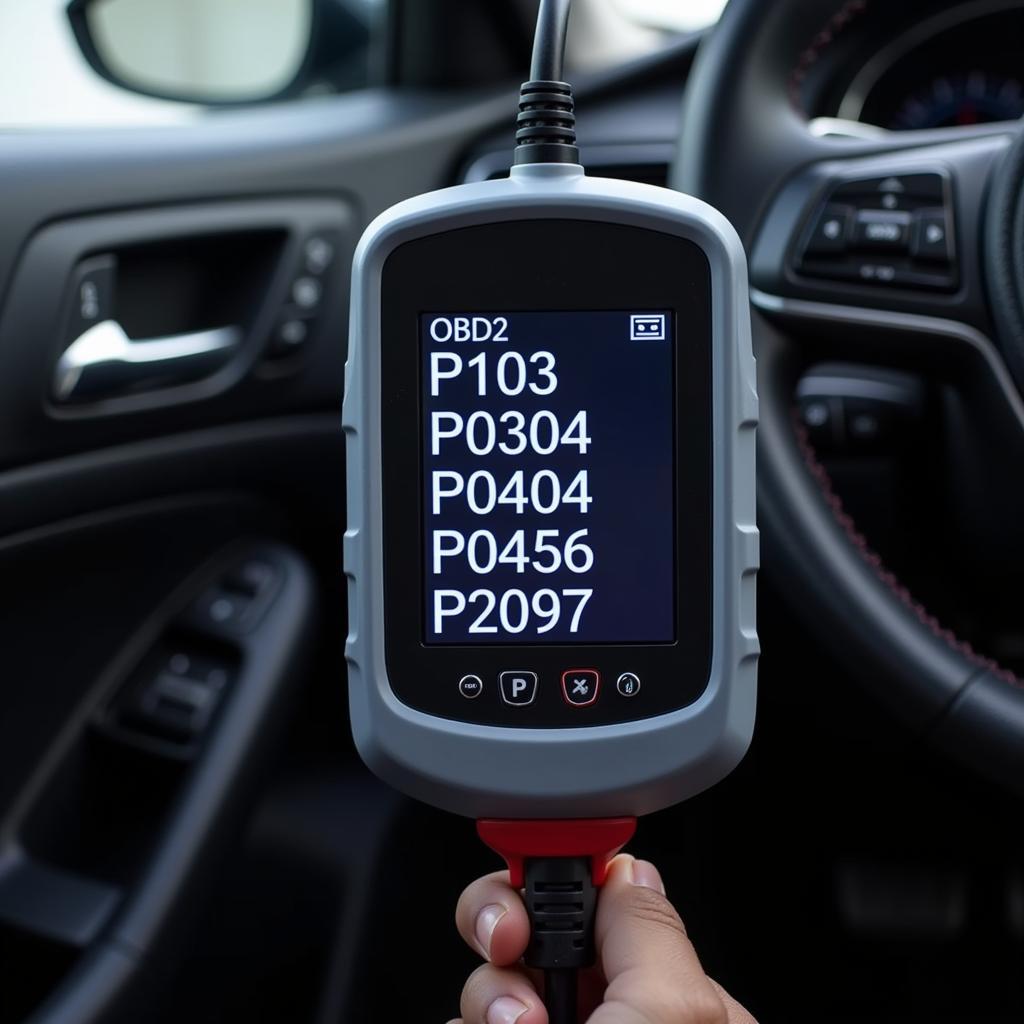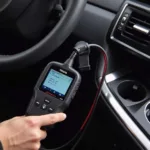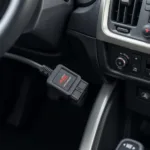When your car’s check engine light flashes, it’s a clear signal that something’s amiss. But what does it mean when your OBD2 scanner throws out codes like P0304, P0404, P0456, or P2097? These codes represent specific issues within your vehicle’s systems and understanding them can be key to diagnosing and resolving the problem. This article will delve into these common OBD2 codes, explaining what they mean, their potential causes, and how to address them.
What does the code P0304 mean?
A P0304 code indicates a misfire detected in cylinder 4. This means that the air-fuel mixture in cylinder 4 is not igniting properly, leading to engine performance issues.
Possible causes of a P0304 code include:
- Worn spark plugs: Spark plugs are responsible for igniting the air-fuel mixture. Over time, they can wear down, leading to weak sparks or misfires.
- Faulty ignition coil: The ignition coil provides the spark plugs with the high voltage needed to create a spark. A failing coil can result in inconsistent or no spark.
- Vacuum leak: A vacuum leak in the intake manifold can disrupt the air-fuel ratio, causing misfires.
- Fuel injector problems: A clogged or malfunctioning fuel injector can disrupt fuel delivery to the cylinder.
What does the code P0404 mean?
A P0404 code signals a problem with the Exhaust Gas Recirculation (EGR) system. The EGR system helps reduce harmful emissions by recirculating a portion of exhaust gases back into the engine cylinders.
Common causes of a P0404 code:
- Blocked EGR valve: Carbon buildup can clog the EGR valve, preventing it from opening and closing properly.
- Faulty EGR solenoid: The EGR solenoid controls the flow of exhaust gases. A malfunctioning solenoid can disrupt this flow.
- Vacuum leak in the EGR system: A vacuum leak can disrupt the pressure differential needed for proper EGR operation.
What does the code P0456 mean?
A P0456 code points to a very small leak detected in the Evaporative Emission Control (EVAP) system. The EVAP system prevents fuel vapors from escaping into the atmosphere.
Potential causes of a P0456 code:
- Loose or damaged gas cap: The gas cap seals the fuel tank. A loose, damaged, or missing cap can cause a small leak.
- Small hole in a fuel vapor hose: Fuel vapor hoses can develop tiny cracks or holes over time.
- Faulty vent control valve: This valve regulates the flow of vapors within the EVAP system.
What does the code P2097 mean?
The P2097 code indicates that the engine control module (ECM) has detected a signal from the downstream oxygen sensor that suggests the fuel-air mixture is running too rich after the catalytic converter on bank 1.
Possible causes of a P2097 code:
- Faulty oxygen sensor: A malfunctioning downstream oxygen sensor may be sending incorrect signals to the ECM.
- Fuel system problems: Issues with the fuel injectors, fuel pressure regulator, or fuel pump can lead to a rich fuel-air mixture.
- Exhaust leak: An exhaust leak before the downstream oxygen sensor can allow unmetered oxygen into the exhaust stream.
Conclusion
Understanding OBD2 codes like P0304, P0404, P0456, and P2097 is crucial for diagnosing and fixing car problems. While this guide offers a starting point, it’s essential to remember that diagnosing car problems requires a systematic approach. If you’re uncomfortable tackling these issues yourself, it’s always best to consult with a qualified mechanic.
FAQs
Can I still drive my car with these codes?
While it might be possible to drive short distances with some of these codes, it’s not advisable. Ignoring these codes can lead to more severe engine damage and costly repairs.
Are these codes specific to certain car makes and models?
No, these codes are standardized across most car makes and models. However, the specific causes and repair procedures may vary slightly.
How often should I get my car checked for OBD2 codes?
It’s a good practice to have your car scanned for OBD2 codes at least once a year or as part of your regular maintenance schedule.
Need further assistance? Contact us via WhatsApp at +1(641)206-8880 or email us at [email protected]. Our 24/7 customer support team is here to help!


